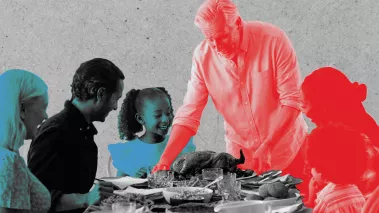Table of Contents
Right, left, and in-between: Can we bring our differences to the table?

“I love people so much, and I think politics has almost destroyed the fabric of our country.”
In a side-building of Old Swedes' Episcopal Church in Philadelphia just weeks after the U.S. general election in November, a right-leaning woman bluntly shared these thoughts with a room full of Republicans, Democrats, and independent observers. It was one of the few ideas at the Red/Blue Workshop that could have just as easily been expressed by a Democrat.
Right or left, we all have reason to be concerned about the future. Right or left, if we choose to spend our Saturday talking to those we disagree with, we must love people.
But this unlikely group had assembled to do just that — not to put their differences aside, but bring them to the table. Thanks to the nonprofit Braver Angels and the Philly-based journal Root Quarterly, a cohort of eight left-leaning participants, eight right-leaning participants, and a roomful of observers attended the workshop as part of a larger project called Founders Weekend.
Organized by Root Quarterly, the program featured a panel discussion on art and self-censorship in collaboration with FIRE, a lecture by Yale University professor Nicholas Christakis, a picnic, and even a musical performance. The goal? To remind Americans that we all have a stake in the future. And to empower us to play an active role in making it a good one.
“We’re proving at Root Quarterly that focusing on our common humanity, beauty, and what values and ideas we hold in common is a winning tactic for bringing people of varying viewpoints into productive conversations with one another,” said organizer and Root Quarterly Editor-in-Chief Heather Blakeslee.
I attended the Red/Blue Workshop as an observer. What I saw illustrates both the promise and challenge of talking across political divides.
The promise: It’s valuable to know what people really think
According to FIRE’s latest National Speech Index survey, 37% of Americans are at least slightly worried about getting fired for something they said, and 62% self-censored at least a handful of times in the month prior to the survey.
When self-censorship is so pervasive, it’s difficult to know what people really think. This makes it harder to understand reality. As FIRE President and CEO Greg Lukianoff often argues, “It is always important to know what people really think and why, especially if their views are potentially pernicious.” That’s because when we know our surroundings, we can better respond to them. It is that knowledge that the Red/Blue Workshop participants bravely set out to discover.

National Speech Index
Reports
The National Speech Index is an ongoing weekly survey conducted by the Polarization Research Lab, which will allow researchers to track shifting free speech sentiment in America over time.
One participant said she typically surrounds herself only with like-minded people and wanted to step outside her bubble. Another was tired of being judged and wanted to set the record straight about his own political beliefs.
One man, a bereavement counselor, said a client of his confessed to feeling sadder after the election than when her husband died. “I found that so profoundly disturbing,” he said.
Many attendees worried that polarization is making it harder to talk across the aisle. They wanted to hear opposing views straight from the source.
They got that opportunity when the moderators, after facilitating separate conversations, brought the reds and blues together to discuss what stereotypes they’ve heard about their side, what those stereotypes get wrong, and whether they contain any grains of truth.
The results were illuminating.
The red team challenged the perception that the right is ignorant, explaining that they value intelligence but don’t equate it with formal education. The blue team dispelled the notion that the left wants government regulation for regulation’s sake, explaining that they favor regulation only when necessary to protect the vulnerable.
Upon reflection, members of both sides were surprised by some of what they heard. A blue participant was relieved to discover that the red team doesn’t universally like President-elect Donald Trump. A red participant was heartened by the fact that the blue team believes in the importance of family.
But it wasn’t all roses.
With an election just behind us and Thanksgiving around the corner, many of us are considering how much to divulge at the dinner table.
Some participants felt that their concerns about the other side were legitimized when that side acknowledged grains of truth in some widely held ideas about them. After the event, for example, a man from the red team was surprised that a blue team member approved of the idea of the left prioritizing the needs of nonwhite individuals.
Even so, the attendees appreciated the opportunity to speak and listen, believing that more dialogue between sides can push policy in a better direction.
“I think if the two of us were on the board of supervisors, we’d figure out the problems in a week,” said one left-leaning man to a right-leaning one.
“It’s okay that we don’t agree,” said another. “As long as we’re out here keeping each other in check.”
The challenge: Talking across differences is hard to do
Near the end of the event, one man observed, “It takes time to have a conversation, and time is in short supply today.”
This hints at an important truth. Conversations benefit from thoughtful speakers and engaged listeners. When we dare to speak our minds, things can go wrong in a thousand different ways, especially when we engage from a place of anger or fear. Truly listening to another’s point of view can be even more daunting, especially when they call our deepest beliefs into question.
That’s why, as an observer, I was struck by the attention, patience, and goodwill that the attendees brought to this event, along with the care that the moderators put into laying the groundwork for constructive dialogue. The experience revealed that under the right circumstances, talking can lead toward mutual understanding, if not mutual agreement. And for that alone, we should be thankful.
With an election just behind us and Thanksgiving around the corner, many of us are considering how much to divulge at the dinner table. Whether we decide to weigh in on immigration policy, the optimal blend of herbs in the mashed potatoes, or mostly keep our opinions to ourselves, we can lend an ear to those who choose to make their thoughts known. In this simple act, we give them the gift of our attention and ourselves the gift of knowledge.
“We are meant to better ourselves through our disagreements,” said Braver Angels national leader John Wood Jr.
Considered in this light, we might discover new reasons to tolerate, and even value, those whose beliefs clash with our own.
Recent Articles
FIRE’s award-winning Newsdesk covers the free speech news you need to stay informed.

FIRE POLL: Only 1/4 of Americans support deporting foreigners for pro-Palestinian views

Harvard’s resistance to Trump is a model for US universities

Sixty-one media organizations and press freedom advocates contest Perkins Coie executive order — First Amendment News 466


